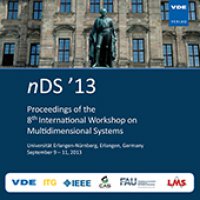The Computation of Purity Filtrations over Commutative Noetherian Rings of Operators and their Application to Behaviors
Conference: nDS '13 - Proceedings of the 8th International Workshop on Multidimensional Systems
09/09/2013 - 09/11/2013 at Erlangen, Deutschland
Proceedings: nDS '13
Pages: 6Language: englishTyp: PDF
Personal VDE Members are entitled to a 10% discount on this title
Authors:
Oberst, Ulrich (Institut f ür Mathematik, Universität Innsbruck, Technikerstrasse 13, A-6020 Innsbruck, Austria)
Abstract:
Due to the theoretical work and computer implementations of, for instance, Barakat, Quadrat and Robertz and their coauthors the theory of finitely generated (f.g.) modules over non-commutative regular noetherian rings of partial differential operators with variable coefficients like the Weyl algebras and over other similar rings has become constructive in recent years. In particular these authors compute the purity or grade filtration of a f.g. module by homological means and discuss its significance for the associated behavior. Pommaret and Quadrat noted this significance already in 1999. In this note it is shown that over an arbitrary commutative noetherian ring of operators the purity filtration can be easily derived from an appropriate primary decomposition, so that various methods and implementations to compute primary decompositions can also be used to compute the purity filtration, the actual implementation of this observation being left to the younger generation. In most books on Constructive Commutative Algebra the connection between purity filtrations and primary decompositions is implicitly stated for cyclic modules. For the standard commutative rings of operators and signal modules the latter are injective cogenerators. This implies, in particular, a one-one correspondence between filtrations of the module and the induced filtrations of its associated behavior and thus establishes the systems theoretic significance of the module filtrations. For non-commutative rings of operators the standard signal modules are in general neither injective nor cogenerators and therefore the connection of a module filtration with its associated behavior filtration is weaker. It is also shown by a counter-example that dimensional purity of the module or behavior does not imply dimensional purity of the initial conditions according to Riquier of the associated homogeneous Cauchy problem. AMS-classification: 93C20, 93C35, 13P25, 13C15


